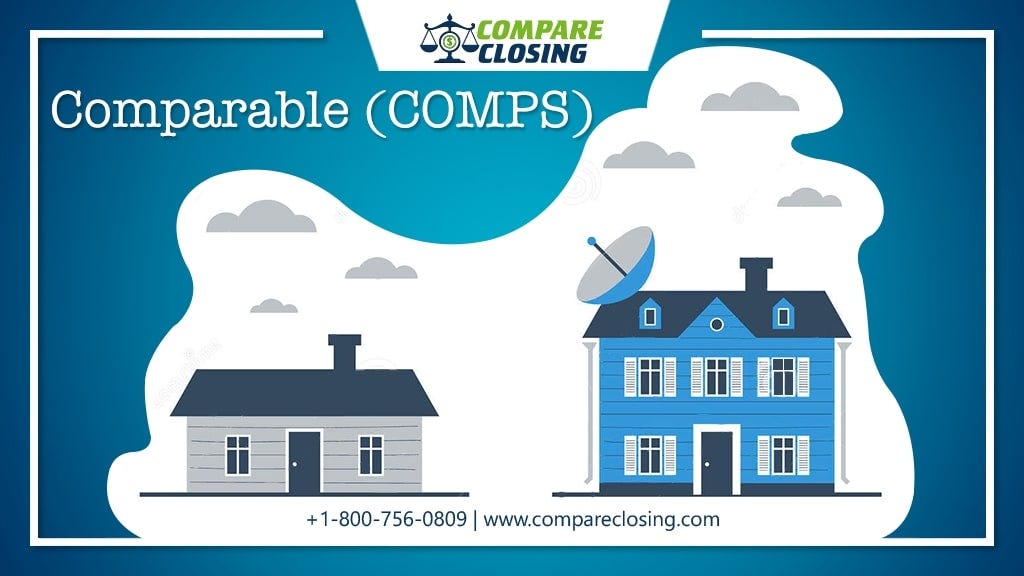
About Comparable (COMPS) in Real Estate
When you are planning to buy a home, your real estate agent will show houses on sale with their listing price.
Every home is different in size, interiors, features, and conditions. But how does a home get listed at a certain price?
This happens with the help of comparable properties. In this post, we will understand what are comps in real estate in detail.
What Are Comparable Properties?
Real estate comparables or COMPS are homes examined by buyers, sellers, and real estate agents in comparative market analysis or a CMA.
This is how we establish a price range for a home’s current market value.
It is much like when you shop for a cell phone, you compare the options that are available to determine if one has more upgrades than the other or one is a better price than the other and ultimately you end up buying one that has the most upgrades and features for the best price.
How Is The Home Value Determined Using Comparable Properties?
Comparable properties are recently sold homes that are similar to the home that you are trying to buy or sell in terms of location, size, condition, and features.
Usually, the real estate comparables are valuable within the entire real estate organization from the buyers, sellers, agents, and also appraisers.
You can get comparable properties through the MLS. If you are in touch with a real estate agent, they can give you access to the MLS and you can look at some of the comparable real estate properties in your area that are similar to either the house that you are planning to buy or sell.
A good real estate agent will always offer to run COMPS for you through CMA. A CMA is usually run within five miles of the home is located that you are either planning to buy or sell.
CMA will compare the property with the size, features, and condition of the home that is been recently sold and compared to the home that you are trying to buy or sell.
How To Run COPMS In Your Area?
If you are a seller who is not using any real estate agent to sell your property whi9ch is also known as for sale by owner or FSBO, you can do your COMS analysis by yourself.
You can start by locating your house on online platforms like Zillow, Trulia, Redfin, Realtor.com, etc.
Once you located your property, you can see the homes that are sold in your area with similar configurations and features like yours like bedrooms, garage, and size.
To do a fair comparison there have to be at least three homes sold within the last ninety days in the area.
Let’s say you find three homes that were similar to yours that were sold in lat ninety days prised at $350k, $375K, and $325k respectively.
Now you need to calculate the average price of the three comparable properties which in our case comes to $350K.
So according to the fair comparison considering your house is similar to the comparables would be fairly valued at $350k.
This is one of the quickest ways to run COMPS to get an idea of the home that you are either buying or selling in that area.
The other way that you can get the COMPS is through public property records. Your county keeps a record of the properties that are sold in the county. You can find information on comparable properties through the county websites.
However, the prices mentioned on the record maybe after the seller’s concessions.
This comparable value may not be the original asking price as there might be some contingencies that the seller might have accepted while signing the sales contract that might have led to lowering the original sales price.
Conclusion
Real estate COMPS are something that all buyers and sellers should be aware of before they start their buying or selling process. Because as a seller you don’t want to have your house overpriced or underpriced.
You will be losing out money by having it underpriced, or you would be losing out on time because you might not be getting any offers on your home if your house is overpriced.
If you are a buyer, you don’t want to overpay for a home because if you haven’t done the comparables of the homes that recently sold in that area, you would end up overpaying for the home if it is being overpriced.
Hence, it is imperative for you to do your homework, and have your real estate agent run the CMA so that you can get a fair idea of what the home is valued at.
https://www.compareclosing.com/blog/about-comparable-comps-in-real-estate/
Comments
Post a Comment